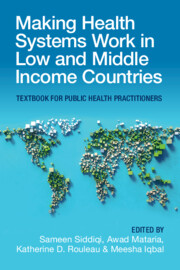
The importance of health systems has been reinforced by the commitment from Low- and Middle-Income Countries (L&MICs) to pursue the target of Universal Health Coverage (UHC), health security, and to achieve the Sustainable Development Goal of Health and Wellbeing [SDG3] and other health related SDGs. COVID-19 has further exposed the fragility of health systems in all countries in tackling the pandemic.
This has been a driving force for the editorial team to put this textbook together with the support of leading experts working in different domains of health systems. Given this context the main motivation for editing this book is to:
While many public health professionals spend their lives generating evidence, creating roadmaps and plans, and formulating policy directions, only a few step-up to act upon them and improve and build the health systems. We believe this book is a must have in the toolbox of public health professionals, whether working in academia, development sector or the public sector. This book will take the reader through the journey from understanding intricacies of the structural and functional components of health systems to confronting challenges, seizing opportunities, and transforming them.
This book has been written to help public health folks in providing a comprehensive resource for understanding, assessing, and improving the performance of health systems. It has been authored by almost a hundred health system experts from across the globe and is rich in content and approach. It is organized around the six building blocks of health systems outlined by the World Health Organization but goes well beyond to cover topics such as primary healthcare, health reforms and healthcare recovery, community engagement, decision-making tools, and universal health coverage to complete the picture. Real world examples and case studies from L&MICs have been included to illustrate the complexities of subject matter. We are sure you will have a lot to learn as did we during its compilation!
A Note on Co-Editorship
Sameen Siddiqi is the lead editor of the book who felt the need of a comprehensive textbook on health systems for L&MICs and came up with the initial concept and contents. He was soon joined by Awad Mataria. The editorial team was complete and balanced in terms of expertise, gender, and geographical distribution once Katherine Rouleau and Meesha Iqbal came on board. The foursome knit together 37 chapters in the form of an all-inclusive book on health systems. We have enjoyed working together as a team and complemented each other’s abilities, skills, and experiences. The work on the book started as the pandemic hit the world. Lockdowns and work from home strategies helped us dedicate the time the book demanded. We are very pleased that the book is being published in 2023 after almost three years of intensive effort. We are very excited to share the product of our collaboration and hope you will enjoy discovering the field of health systems!

Title: Making Health Systems Work in Low and Middle Income Countries
Authors: Sameen Siddiqi, Awad Mataria, Katherine D. Rouleau and Meesha Iqbal
ISBN: PB- 9781009211093
Latest Comments
Have your say!